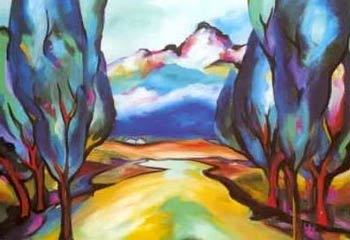
Eric G. Müller
The Climb
“Let’s climb it.”
We were lying on a massive bolder, sunbathing at the bottom of Tonquani Gorge—a deep and
narrow cleft that cut through the rugged Magaliesburg Mountains, an hour north of
Johannesburg. It was midday and we were in our undies, enjoying the sun while it lasted,
after a swim in one of the chilly rock pools. Soon the shadows would start
moving in. I’d been eying the approximately two-hundred foot vertical cliff
for a while, thinking it would be a cinch to climb.
A few weeks ago we’d come here with the Wits Mountaineering Club and climbed with ropes
and things. We’d both found it ridiculous having to use all the climbing gear for such
easy climbs on the upper end of the gorge. Of course, the idea was to get us used
to handling the climbing equipment—bolts and hangers, belay and rappel devices, biners,
harnesses, anchor slings, and whatever other accessories were demonstrated.
Pierre looked up at the craggy sandstone cliff, squinted and said, “Okay, why not?”
We got up, naked as we were, except for our briefs, and not without some bravado—“we don’t
need no fancy climbing stuff!”—started climbing, using only our bare hands and feet.
We made swift progress. There were plenty of ruts and furrows for us to make steady headway.
Soon, however, I began to tire and wanted to rest my arms and legs—not so easy when you’re hanging on a vertical cliff. I slowed down, remembering that climbers need to pace themselves. Then I made the silly mistake of looking down. The boulder we’d sunbathed on so insouciantly just a short while ago looked surprisingly small. We must have been anywhere between fifty and seventy five feet up. Fear walloped my breath away and my blood drained from my face.
I could feel a dead-weight pulling me down. Looking up I saw how far I still had to climb. Instantaneously I thought of jumping, but I’d never survive; or of pushing myself off the cliff wall to land in the rock pool. The chances of making it were slim, at best; and severe injuries a certainty.
I tried climbing down, but after a tentative attempt I saw the absolute futility of that
naïve notion. Not only my knees, but my whole body turned to jelly—an apt cliché.
It was a miracle I was even able to hold onto the cliff at all. I marveled at
the mysterious force. It seemed like my willpower had a mind of its own, taking charge
while I was dissolving. I looked in wonder at my hands and fingers clasping the rock
so tightly. What made them do that? What if they’d just let go without my consent?
My mind was bubbling over.
“Pierre.” He was about two yards to the right of me.
“Yes?”
“I can’t go on.” I felt like a wimp, confessing my dilemma.
“Really! Well, guess what?”
“What?” I was expecting him to poke fun at me.
“Nor can I!”
“Oh shit!”
We clung against the wall in silence. Hapless! But really there was only one
thing to do—climb to the top. We couldn’t help each other. We were utterly on our own—two
almost naked people stuck on a cliff face. Suddenly the idea of ropes, harnesses, bolts,
and hangers seemed very appealing. We didn’t even have a thread to hang on.
It seemed absurd to think how quickly and close-up death had suddenly come.
I pictured myself falling—felt it in every sweaty pore. Images of parents and friends
shot through my mind. Would my entire life rise up like a tapestry in the moment
of dropping? I began to think of my childhood, the places I’d lived, people I’d met,
things I’d done. Random images welled up, distracting me—it’s already happening...I’m
already seeing my past flit by...must breathe deep...
To gain strength I leaned my head against the sun-drenched cliff, hugged it with my
entire body. It was no longer a foe to conquer, but a friend to love. I stayed still
like that till my breathing had stabilized itself and my thoughts had regained their
focus. I told myself: slowly does it, must advance slowly, one movement at a
time...must pause in between...must never look down...
So I started to climb, and out of the corner of my eyes I saw Pierre do the same. We didn’t speak another word. We heard each other pant, merging with the sound of the cicadas below us and the far-off bark of baboons. Blood thumped through my temples. Time was sucked into the all encompassing moment. My senses were on high alert. My fingers and feet felt the contours of each rock, testing it for its strength. Upwards, inch for inch, foot for foot, we climbed, in intimate contact with the cliff. When I did dare to look up I saw we only had a couple of yards to go. It wouldn’t do to lose focus now, not now, right before the end. The sun was shining down hard on us. But it was the sun at the top of the gorge.
Pierre made it up first. He gave me his strong hand and pulled me to safety. Without a
word we both crawled a few feet away from the edge and fell down flat, giving way to
gravity at last. We’d made it. I was elated with relief. I’d been given a new lease
on life—after almost succumbing to hubris. I was eighteen at the time, and in
that supine moment I swore that I'd never again treat life as lightly as I had treated
that cliff-face at Tonquani Gorge, South Africa.
©2010 by Eric G. Müller


